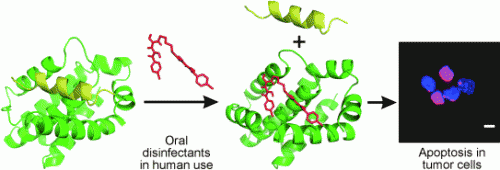Mouthwash to fight cancer? Oral disinfectants induce apoptosis in human oral tumor cells

(Phys.org) —Patients who suffer from gingivitis are often advised to use disinfectant mouthwashes. In the future, the active ingredients in these products could be used in a completely different area: As scientists have reported in the journal Angewandte Chemie, Chlorhexidin and Alexidin increase programmed cell death and may be effective against cancers of the mouth and throat.
Sometimes researchers discover that established drugs have other effects in addition to those for which they were actually approved. For example acetylsalicylic acid (Aspirin) has commonly been used to treat pain and fever; more recently, however, it has also been prescribed to thrombosis-prone patients as a blood thinner. A team headed by Thorsten Berg is now convinced that many low-molecular drugs already in use demonstrate previously unrecognized activity toward interactions between proteins, which may be of therapeutic use.
The team of scientists from the University of Leipzig, the Max Planck Institute for Biochemistry, the Center for Integrated Protein Science Munich, the Helmholtz Center Munich, the Technical University Munich, and the ETH Zurich were out to use a protein–protein interaction relevant for human health to demonstrate the interactions between two proteins whose interaction controls apoptosis, or programmed cell death. Both proteins are from the same protein family. The first protein, Bad, initiates apoptosis-promoting protein to inhibit it.
The researchers proceeded to screen a collection of over 4000 substances known as a compound library. The majority of the compounds in the library are small molecules in clinical use. Binding experiments were used to determine which of the substances inhibit the binding of the two target proteins. To determine the specificity of the "hits", their effects on other protein–protein interactions were also tested.
Berg and his co-workers were successful: Chlorhexidin, the active component in commercial oral disinfectants such as Chlorhexamed, Chlorhexal, Periogard, Corsodyl, and Chlorohex; as well as Alexidin, the active component in Esemdent, both inhibit the binding of the apoptosis inhibitor to the apoptosis trigger. Chlorhexidin's effect is specific, while Alexidin has additional very weak effects on other proteins.
Why are apoptosis proteins interesting? Apoptosis is decreased in tumor cells, so the cells do not die off and continue to divide. One reason for this is that they produce too much of the apoptosis-inhibiting protein. In experiments with cultures of cells from various tongue and throat carcinomas, both compounds caused increased apoptosis. This effect is much stronger in the cancer cells than in healthy cells. It may be possible to use these drugs in therapeutic applications.
The researchers hope to find other protein-protein interactions that could be targeted with approved small-molecule drugs.
More information: Berg, T. Oral Disinfectants Inhibit Protein–Protein Interactions Mediated by the Anti-Apoptotic Protein Bcl-xL and Induce Apoptosis in Human Oral Tumor Cells, Angewandte Chemie International Edition. dx.doi.org/10.1002/anie.201208889
Journal information: Angewandte Chemie , Angewandte Chemie International Edition
Provided by Angewandte Chemie
















